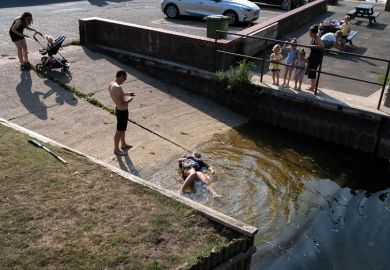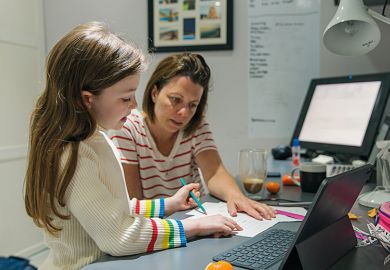It will not be news to tired parents working in universities that having children can decrease their professional productivity.
But a paper published in Nature Scientific Reports has sought to quantify how an academic’s output is impacted by the amount of parental work they engage in at home.
It surveyed more than 10,000 scientists across the globe on their child-rearing styles – one of the largest samples of publishing parents – and matched them with their authored work.
In doing so, researchers wanted to properly capture the complexity of modern parenting – one where a dual-labour household is the norm, and fathers take an increasing role in child-rearing.
They wanted to move beyond the “current binary categorisation of parenthood” and examine how parental engagement influences research productivity on a spectrum, and whether or not parenting with a fellow academic made a difference.
“To assume that because somebody is a parent that they are equally involved in parenting as a verb – rather than just as a noun – is a little superficial,” Gemma Derrick, the paper’s lead author and an associate professor in the University of Bristol’s Centre for Higher Education Transformation, told Times Higher Education.
“We wanted to look at parenting rather than parental roles assigned to gender because then we get a more complex image of how parenting is managed.”
To look at three types of parenting styles – “lead”, “dual” and “satellite” – statistical modelling of researcher productivity and visibility was used, along with coding analysis of free-text comments.
These methods revealed that women are disproportionately more likely to serve as the primary caregiver, although the norm was one of shared or dual parenting.
Results showed both men and women suffer a productivity loss when they are single or lead parents, although having an academic partner has a small but positive effect.
The wide range of parenting tasks examined included preparing meals, picking up from school, and putting to bed – with women found more likely to be the parent engaged in almost all of them.
The only task with which men were significantly more likely to be associated was coaching sport.
Men were found to be most productive when they are in satellite roles with academic partners, while women were most productive when in a satellite role with a non-academic partner.
“Irrespective of gender and of whether people were a lead, a dual or a satellite parent, the people who were responsible for taking on the parenting activities – the majority of the activities – between 8pm and 6am were unmistakably women,” said Dr Derrick
“Women were overwhelmingly taking on the majority of the night-time shifts and this has repercussions for how they perform at work.
“The workplace doesn’t take that into account when it comes to deadlines, teaching responsibilities or performance related evaluations.”
She said universities need to engage with academics on an individual basis around how they can mitigate the cost of parental engagements, and be aware that some people may not be able to meet deadlines as quickly.
Beyond the paper’s findings, Dr Derrick said the research questions prompted discussions in the families of survey respondents – and the researchers themselves – on their own child-rearing styles and relationships.
Register to continue
Why register?
- Registration is free and only takes a moment
- Once registered, you can read 3 articles a month
- Sign up for our newsletter
Subscribe
Or subscribe for unlimited access to:
- Unlimited access to news, views, insights & reviews
- Digital editions
- Digital access to THE’s university and college rankings analysis
Already registered or a current subscriber?








